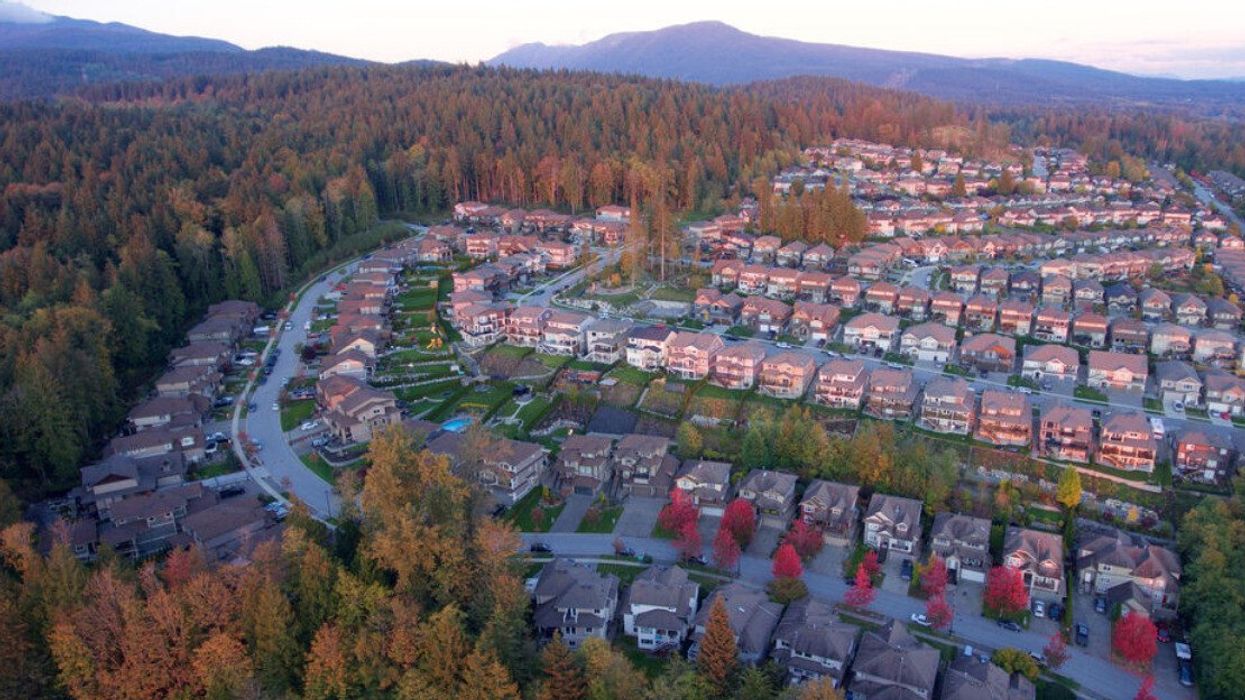Canada's Housing Market Is Eerily Similar To 2013 & It's Fuelled By First-Time Homebuyers
It's giving déjà vu of 10 years ago.

Aerial view of a suburban neighbourhood in Canada.
In many ways, we're in an outlying time for real estate. Canadians are reeling from what is being regarded as the most aggressive rate hike campaign in Bank of Canada history, and amid soaring borrowing costs, owning a home is far less attainable than it once was.
Even so, a new report from Zoocasa draws a number of parallels between market conditions today and those from 10 years ago, saying that "buyer mentality, mortgage rates, unaffordability and demographics were not as opposing and could provide an indication of future trends."
Pressed housing affordability
Although home prices have nearly doubled over the past decade — the national average grew from $365,700 in January 2013 to $705,000 in January 2023 — both points in time can be characterized by a lack of housing affordability.
In fact, according to the Bank of Canada's Housing Affordability Index, which measures how housing-related costs like mortgage payments and utility fees stack up to average household disposable income, unaffordability rose between Q1 and Q4 of 2013 and has never returned to the level it was in Q1 of 2013.
What's more, prices in 2013 were on the cusp of stabilizing, much like they have this year in the aftermath of the "pandemic spike," writes Mackenzie Scibetta. "The extreme ups and downs of recent years are outliers, meaning if prices are stabilizing, we might expect a more predictable, slower rate of growth to come in the future."
The return of first-time buyers
The year 2013 also saw an uptick in buying activity, particularly in major urban centres, including Greater Vancouver, Greater Toronto, Calgary and Hamilton-Burlington. This was attributed to low interest rates, says Scibetta, which "helped to push first-time homebuyers into the market as mortgage payments remained affordable and predictable."
Although mortgage affordability today is nowhere near what it was 10 years ago, major Canadian real estate markets are similarly seeing hearty demand from first-time buyers, including new-Canadian buyers, who are flooding into the country at a record pace.
"Also fuelling the competition are first-time homebuyers, who largely stayed on the sidelines in 2022 but have now adjusted to the prospect of interest rate hikes and are eagerly participating in the market," continues Scibetta.
She adds, however, that housing demand is panning out a little differently these days. "Buyers today value affordability and larger living spaces, which is leading to heightened interest in smaller maritime cities and the Prairies."
Fixed-rate pain
Interest rates hit a 22-year high this year, with the Bank of Canada bringing its benchmark rate to 5% in July. Although the current lending rate is "drastically" higher than it was in 2013 — when the overnight lending rate was at 1% and remained at that level until January 2015 — fixed-rate mortgage holders "were not as far away from today's rate," says Scibetta.
"At the beginning of 2013, the interest on a five-year fixed mortgage rate was 5.24%, and in September 2013, it increased to 5.34% before going back down to 5.24% at the beginning of 2014."
With respect to today's rate realities specifically, Scibetta adds that there may be some reprieve in sight. "If the past is any indication of the future, mortgage rates will start to gradually lower in the next few years as they did in 2014 and 2015," she says.
Greater demand for condos
Although the Canadian condo sector has not been exempt from affordability-related headwinds this year, condos remain a popular and pragmatic choice for first-time homebuyers.
"After waiting on the sidelines most of last year, first-time buyers are eager to dip their toes into the housing market, and condos offer one affordable way to do that," writes Scibetta.
"Compared to other property types in Toronto, condo apartments experienced the largest year-over-year growth in July at 26%. Similarly, in Vancouver apartment sales were up year over year by 20.7% and experienced the largest year-over-year price growth among property types."
Comparable trends were observed in 2013 as well, says Scibetta. She points to data from the Toronto Regional Real Estate Board, which shows that condo sales were up 21% year over year in the fourth quarter of 2013. In Vancouver, sales rose by 68.7% between December 2012 and December 2013, according to data from the Real Estate Board of Greater Vancouver.
The post "Homebuying Today Versus 2013: Here's How The Canadian Housing Market Is Similar" first appeared on Storeys.